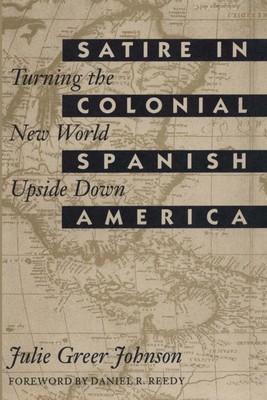
- We will send in 10–14 business days.
- Author: Julie Greer Johnson
- Publisher: University of Texas Press
- ISBN-10: 0292729804
- ISBN-13: 9780292729803
- Format: 15.2 x 22.9 x 1.3 cm, softcover
- Language: English
- SAVE -10% with code: EXTRA
Reviews
Description
Satire, the use of criticism cloaked in wit, has been employed since classical times to challenge the established order of society. In colonial Spanish America during the sixteenth through the eighteenth centuries, many writers used satire to resist Spanish-imposed social and literary forms and find an authentic Latin American voice. This study explores the work of eight satirists of the colonial period and shows how their literary innovations had a formative influence on the development of the modern Latin American novel, essay, and autobiography.
The writers studied here include Sor Juana Inés de la Cruz, Juan del Valle y Caviedes, Cristóbal de Llerena, and Eugenio Espejo. Johnson chronicles how they used satire to challenge the "New World as Utopia" myth propagated by Spanish authorities and criticize the Catholic church for its role in fulfilling imperialistic designs. She also shows how their marginalized status as Creoles without the rights and privileges of their Spanish heritage made them effective satirists. From their writings, she asserts, emerges the first self-awareness and national consciousness of Spanish America.
By linking the two great periods of Latin American literarure--the colonial writers and the modern generation--Satire in Colonial Spanish America makes an important contribution to Latin American literature and culture studies. It will also be of interest to all literary scholars who study satire.
EXTRA 10 % discount with code: EXTRA
The promotion ends in 11d.19:37:15
The discount code is valid when purchasing from 10 €. Discounts do not stack.
- Author: Julie Greer Johnson
- Publisher: University of Texas Press
- ISBN-10: 0292729804
- ISBN-13: 9780292729803
- Format: 15.2 x 22.9 x 1.3 cm, softcover
- Language: English English
Satire, the use of criticism cloaked in wit, has been employed since classical times to challenge the established order of society. In colonial Spanish America during the sixteenth through the eighteenth centuries, many writers used satire to resist Spanish-imposed social and literary forms and find an authentic Latin American voice. This study explores the work of eight satirists of the colonial period and shows how their literary innovations had a formative influence on the development of the modern Latin American novel, essay, and autobiography.
The writers studied here include Sor Juana Inés de la Cruz, Juan del Valle y Caviedes, Cristóbal de Llerena, and Eugenio Espejo. Johnson chronicles how they used satire to challenge the "New World as Utopia" myth propagated by Spanish authorities and criticize the Catholic church for its role in fulfilling imperialistic designs. She also shows how their marginalized status as Creoles without the rights and privileges of their Spanish heritage made them effective satirists. From their writings, she asserts, emerges the first self-awareness and national consciousness of Spanish America.
By linking the two great periods of Latin American literarure--the colonial writers and the modern generation--Satire in Colonial Spanish America makes an important contribution to Latin American literature and culture studies. It will also be of interest to all literary scholars who study satire.


Reviews